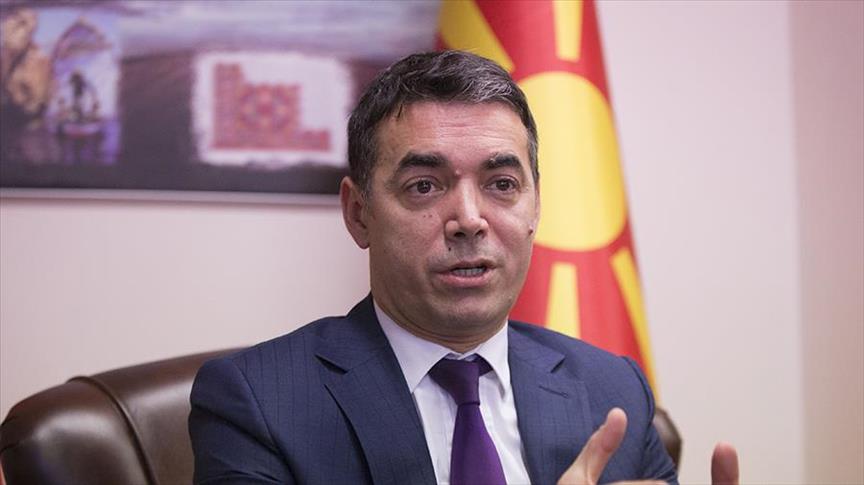
By Fatih Hafiz Mehmet
ANKARA
The Macedonian foreign minister has said that the Prespa agreement over the Macedonia name dispute with Greece is "too big to fail".
Nikola Dimitrov spoke to Anadolu Agency in an exclusive interview during an official visit to Ankara.
Dimitrov said the stakes that are involved and the words of praise coming from all over the world made the Prespa agreement crucial.
On Jan. 11, Macedonian parliament approved constitutional amendment to change the country's name to Republic of North Macedonia as part of the Prespa agreement.
In June, the Macedonian and Greek governments signed the Prespa Agreement, which required Macedonia to change its name and Greece to drop its objection to Macedonia joining NATO and becoming a member of the European Union (EU).
Dimitrov said the government of Greek Prime Minister Alexis Tsipras received a vote of confidence from the parliament recently.
"So I think soon, in a matter of days, we will see this ratification in the Greek parliament," Dimitrov said.
Dimitrov said after that there will be voting of the accession protocol for Macedonia to join NATO in the Greek parliament, and with that ratification, the process will be finalized.
Calling the process historic, he said: "Macedonia has lost a generation waiting because of this name issue."
Dimitrov said Macedonia is a candidate country for the EU since 2005.
"After Turkey, we are the most experienced country in waiting (for EU membership)," he added.
Dimitrov said after the ratification process is complete in Greece, Macedonia's NATO membership will be faster than the country's EU membership.
"Formally, this will take place (NATO membership), depending on the speed of the processes in different parliaments, probably, early next year.
But in reality, we are going to be on the table very soon, maybe even in February or March this year," Dimitrov said.
Turkish- Macedonian relations
Dimitrov said Turkey was one of the first countries that recognized the independence of Macedonia and therefore they share a special relationship.
"Partly because we have shared common life for centuries in the Ottoman days and partly because there are many Turks who emigrated from Macedonia to Turkey," he said.
Currently, there are also many Turks in Macedonia, Dimitrov said.
"They are well integrated into our society," he added.
Dimitrov said during his visit to Ankara, he discussed with Turkish Foreign Minister Mevlut Cavusoglu ways to improve economic relations, adding that he was eying $1 billion in bilateral trade.
He said he also discussed the issue of refugees, the stability of Balkans and fight against terrorism.
Dimitrov said Macedonia is "fully aware" of Turkey's fight with Fetullah Terrorist Organization (FETO).
"As a friend, if there is a big problem for Turkey, it is also a problem for us," he stressed.
Dimitrov said they welcomed the establishment of Maarif Foundation in Macedonia.
"They opened the first school near Tetovo in March 2018 and this is a development that we very much welcomed in terms of the quality of education that is provided and I think more will follow in this direction," he said.
Turkey established the Maarif Foundation in 2016 after a coup attempt to take over the administration of overseas schools linked to FETO. It also establishes schools and education centers abroad.
FETO and its U.S.-based leader Fetullah Gulen orchestrated the defeated coup of July 15, 2016 in Turkey, which left 251 people martyred and nearly 2,200 injured.
Ankara also accuses FETO of being behind a long-running campaign to overthrow the state through the infiltration of Turkish institutions, particularly the military, police, and judiciary.
FETO has a considerable presence abroad, including private schools which serve as a revenue stream for the terror group.
Kosovo- Serbia dialogue
Regarding a possible land swap between Kosovo and Serbia, Dimitrov said in a united Europe borders are essentially invisible.
"Land swaps, ethnic borders are concepts of the past," he said.
He said in Macedonia they are proud of their diversity, and there are Turks, Albanians, Serbs, Vlachs, Bosniaks and Roma living in the country.
"We welcome the dialogue between Belgrade and Pristina, but we have to be wise," he said.
Dimitrov said they witnessed human tragedies in the Balkans in the 90s when ethnic boundaries were idealized or glorified.
Kosovo declared independence from Serbia in 2008, but Belgrade insists the country remains part of Serbia. Since then, tensions have persisted between Kosovo’s ethnic-Albanian majority and a small Serb minority in the north.
Kosovo’s independence is recognized by over 100 countries, including the U.S., Britain, France, Germany and Turkey.
Serbia, Russia, and China are among the countries which have not yet recognized its independence.
Anadolu Agency website contains only a portion of the news stories offered to subscribers in the AA News Broadcasting System (HAS), and in summarized form. Please contact us for subscription options.







